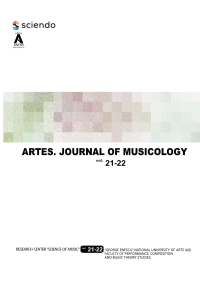Antonin Reichaʼs didactic cycles: between theory and practice
DOI:
https://doi.org/10.35218/Keywords:
didactic cycle, duet, fugue, A. Reicha, study, trio, variationsAbstract
Antonin Reicha (1770-1826) was a reputed Czech composer, theorist and teacher, who studied in Germany, and was naturalized French, who composed numerous musical works in different genres and wrote several treatises on different aspects of the sound art. An important place in Reichaʼs artistic heritage is occupied by the didactic cycles, which represent examples of works that happily combine instructional and artistic purposes, being developed as a support for the composerʼs didactic activity and at the same time as a supplement to his theoretical writings. The author emphasizes repeatedly that the theory must be justified by practice and that the student must know the principles of the contemporary composition and not just the old rules by which the predecessors were guided. This article examines Reichaʼs didactic cycles, among which we find collections of fugues, variations, duets and trios, as well as some collections of studies. Considering the large number of works named by Reicha Studies he can rightly be considered one of the parents of this genre in French music. But in Reichaʼs case, the aim of the studies is not only to cultivate virtuosity itself, but rather complex exercises that involve both the “technological” processes of interpretation and the “spiritual” ones. In our opinion, the figure of this musician, his theoretical writings and compositional works eloquently illustrate the dialectical relationship between tradition and innovation on the one hand and the complex relationship between musical theory and practice on the other.
Downloads
Published
Issue
Section
License
Copyright (c) 2023 ARTES. JOURNAL OF MUSICOLOGY

This work is licensed under a Creative Commons Attribution-NonCommercial 4.0 International License.

